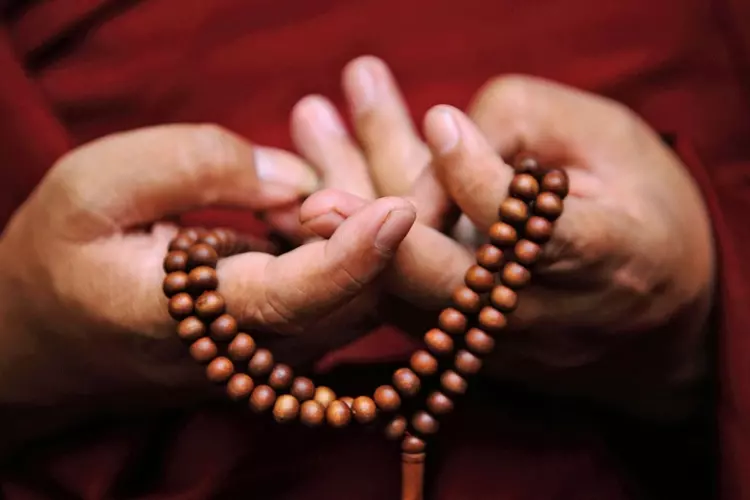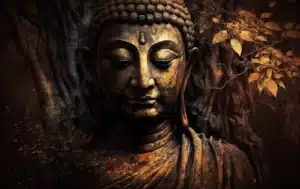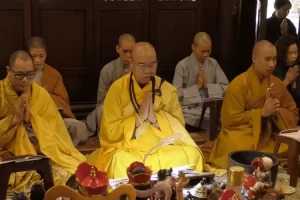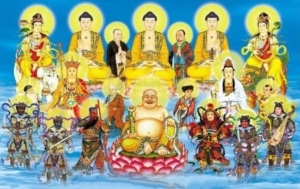The Great Compassion Mantra is one of the most popular mantras in Buddhism, and is recited by many Buddhists because of its powers of healing, purification and protection.
Many of my family members strongly believe in the miracles of Buddhas and Bodhisattvas in general and the Great Compassion Mantra in particular. Some time ago, when I heard my parents ones chant these strange sounds, I wondered and asked them about the meaning of the mantra.
But all the answers did not know or could not know because they said that this is the Holy syllable, the mantra of Avalokitesvara Bodhisattva, no need to understand its meaning but recite it with a sincere heart. Bodhisatta bless. And I believe it!
I enjoyed listening to the Great Compassion Mantra and also chanted the mantra often, but my inner curiosity prompted me to learn more about it. Therefore, I went online to search for articles about the benefits and meaning of the Great Compassion Mantra – the main purpose of reciting this mantra to send to readers of Lotus Buddhas.
What is Great Compassion Mantra?

The Great Compassion Mantra known as Great Compassion Dharani or Da Bei Zhou in Chinese, which is an 84-line and 415 words Buddhist mantra of Mahayana Buddhism that was first translated from Sanskrit into Chinese. Chinese in the 7th century. In Sanskrit, the ancient language of yoga, it is called Mahakaruna Dharani or Nilakantha Dharani.
Dharani is a scripture that uses syllables to convey a powerful and effective transcendental message, induces a particular state of consciousness, and is said to have the ability to liberate all suffering beings in the hells and the world.
In all Buddhist sutras and mantras, they are divided into two parts: the visible part (the sutra part) and the secret part (the mantra part).
The visible part: It is to display the meaning and truth in the Sutra for practitioners to recite, or study and apply the practice, then it is called: “Chanting the Buddha’s wisdom”, in order to understand the function of the sentence. Sutras are called display sections.
For example: The Great Compassion Mantra “Thousand hands and eyes are not afraid to save suffering” This sutra is an obvious part explaining the function and wonderful use of the following 84 mantras, to help practitioners understand and practice properly potent.
The secret part of the Great Compassion Mantra is the “mantra”. The part of the mantra is the hidden meaning only in Sanskrit only the Buddhas can understand. Ordinary people do not understand the meaning, only know the functions and benefits to practice.
This is probably the 2nd most popular mantra after Om Mani Padme Hum. 84 is a beautiful number in Buddhism, although a relatively long mantra it is chanted by many fervent followers of the Buddha to show compassion for all sentient beings.
Around the world, millions of lay Buddhists recite the Great Compassion Mantra of Avalokiteshvara Bodhisattva to enjoy the great benefits of the mantras healing, protection and purification.
Why is the Great Compassion Mantra so popular? Because it carries a very great meaning, it represents the immeasurable compassion of the Buddhas and Bodhisattvas for all sentient beings. This is the core of the Bodhisattva’s compassionate mission.
The immediate benefits, as taught in the scriptures, are purification of bad karma, purification, healing, and protection. With great compassion, the Great Compassion Mantra can relieve the sufferings and difficulties of all species on this planet.
For Buddhists who follow Mahayana Buddhist thought, everyone knows the Great Compassion Mantra, the benefits that the mantra brings is indescribable. Therefore, Buddhists recite this mantra a lot, they often go to the temple to worship Buddha, fast, release animals and do charity.
It is possible that the Great Compassion Mantra has positively influenced a part of their mind, developing compassion and love in a body that has to constantly face life’s adversities.
Mantras are often sung or chanted in Sanskrit, not English, Thai, Vietnamese or Chinese translations. Translations often require a deep study of the “word meaning”, but like all mantras, the meaning of the word is not important.
Sanskrit is a language of “Holy syllables”, not only formed words but also sacred sounds that have its invisible layers of meaning. For this reason, Great Compassion Mantra is often recited in Sanskrit.
The Origin of the Great Compassion Mantra
The origin of the Great Compassion Mantra originates from the story between Avalokitesvara Bodhisattva and the Buddha: In the Sutra, Avalokitesvara Bodhisattva told the Buddha that:
“Namo, I have the Great Compassion Mantra, I would like to say it now, because I want all sentient beings to be happy, to get rid of all diseases, to live a long life, to be rich, to have all their karma destroyed evil, being far away from all obstacles, attaining all the roots of good, having all fear dissipated, quickly having all the desired places fulfilled. Then read the Great Compassion Mantra.”
After the Bodhisattva finished the mantra, the earth changed six times, the heavens rained precious flowers and flowers scattered, all the Buddhas in the ten directions were happy, and the gods of the outside world were afraid to raise their hairs. Since then, the Great Compassionate Mantra was born and all sentient beings have rejoiced.
Bodhisattvas have brought salvation to everyone, even those who have committed unforgivable sins. Avalokitesvara Bodhisattva is one of the most important bodhisattvas in Mahayana Buddhism, who uses the compassion of all Buddhas.
The Benefits of the Great Compassion Mantra

The mystery and effectiveness of the Great Compassion Mantra is indisputable. It has a protective, purifying effect and can also heal all kinds of diseases, especially mental afflictions.
According to Wikipedia, the Great Compassion Mantra is a popular mantra along with Avalokitesvara Buddha in East Asia, this mantra is often used to protect or to purify, the retribution and merit of those who recite the mantra are inconceivable!
Whether you are Buddhist or not, believe in the power of the mantra or not, when you recite the Great Compassion Mantra, you will receive the inexplicable miraculous benefits of this mantra.
1. Avalokitesvara Bodhisattva talks about the benefits of reciting the Great Compassion Mantra
- Bhagavan, any living being who recites and holds the Mantra of Great Compassion if he falls into the three evil paths, I vow not to attain enlightenment.
- If any living person who is reciting and holding the Great Compassion Mantra is not reborn in any Buddha realm, I vow not to attain enlightenment.
- If anyone who recites and holds the Great Compassion Mantra does not have happiness and unlimited eloquence, I vow not to attain enlightenment.
- If any person is chanting and holding the Great Compassion Mantra, if he does not have anything in his present life, then it cannot be called the Dharani of the Compassionate Heart, unless it is used. used by people who are unethical or not entirely sincere.
2. Those who often recite the Great Compassion Mantra will never suffer the following 15 forms of death
- They will not starve.
- They will not die from oppression, imprisonment, beatings.
- They will not die under hostile enemies.
- They will not be killed in military battle.
- They will not be killed by tigers, wolves, or wild beasts.
- They will not die from snake or scorpion venom.
- They will not drown or burn to death.
- They will not be poisoned to death.
- They won’t die from magic.
- They won’t die of madness.
- They won’t be killed by landslides or fallen trees.
- They will not die from nightmares caused by bad people.
- They will not be killed by the devil.
- They will not die of fatal diseases.
- They will not commit suicide.
3. Those who hold and recite the Great Compassion Mantra will receive the following 15 good things
- Their birthplace will always have a good king.
- They will always be born in a good country.
- They will always be born at a good time.
- They will always meet good friends.
- The organs of the body will always be healthy.
- Their hearts will be pure and complete.
- They will not violate the prohibitions.
- Their family will be kind and harmonious.
- They will always have wealth and happiness.
- They will always receive the respect and help of others.
- Their wealth will not be plundered.
- They will get everything they are looking for.
- Good dragons, gods and spirits will always protect them.
- In the place of birth, they will see the Buddha and hear the Dharma.
- They will awaken to the profound meaning of the appropriate Dharma that they hear.
When you recite the Great Compassion Mantra 108 times a day for 1000 days, the Buddhas of the ten directions will be very happy, the family peaceful, happy and all diseases will be cured.
All the demons in hell must bow down to you, the Buddhas of the past, present and future will protect you. They will notify all other devil not to get you in trouble. So the power of this mantra is unimaginable.
Mantras help us cultivate Bodhichitta, generate compassion to help others, give to receive in return, be the extended arms of bodhisattvas in saving sentient beings. With a sincere heart accompanied by positive actions, you will surely benefit from the mantra if you follow the instructions.
This is a quote from Venerable Master Tuyen Hoa:
“If humans or gods recite Great Compassion Mantra, then when they reach the end of their lives, all the buddhas of the ten directions will come to receive them, and help them to be reborn in any buddha realm they want, according to their will…
People and gods who recite this mantra will have 15 kinds of good births and will not suffer 15 bad deaths…All gods and humans must constantly recite and keep it, without thinking”.
The Magical Meaning of the Great Compassion Mantra
Some people think that chanting the Great Compassion Mantra is not necessary to understand its meaning. Because it is the Holy syllables, only the Buddhas or the enlightened ones can understand.
There are also people who say that reciting mantras, chanting or reciting the Buddha’s name is the same as meditation. It is to focus on the object without introducing subjective thoughts to explain or judge. Let the mantra manifest its own meaning.
That’s why many people while chanting the Great Compassion Mantra should not learn the meaning; but when entering the world, when you open your eyes, you have to communicate everything, bring that communication into your spiritual practice and share that meaning with others so that they can understand. Here, Lotus Buddhas would like to explain each sentence in the Great Compassion Mantra for people to better understand this mantra:
Adoration to the Almighty One.
Adoration to the noble Avalokitesvara, bodhisattva, the Great Compassionate One.
I continually adore the One who Dispels all Fears,
O noble Avalokitesvara, to You adoration, O Nilakantha.
I shall clearly sing the ‘heart’ dharani for the sake of all beings, for it is pure and serves all purposes for all beings, as it purifies the path of soul existence.
Therefore, Lord of Radiance, World-Transcending One.
Come, come, great bodhisattva, descend, descend. Bear in mind my heart-dharani.
Do, do the work in our souls.
Hold fast, oh Victor, oh Great Victorious One.
Hold on, hold on, oh Lord of the Dharani.
Move, move oh my immaculate image, come, come.
Destroy every poison.
Quick, bear in mind, quick, quick, descend, descend.
Enlightened being, O enlightened being, enlighten me, enlighten me. Oh merciful
My Lord, appear unto me. To You who sees our all, Namo. To the Great Lord, Namo. To the Great Lord in Yoga, Namo. To my Lord, Namo. To the Varaha*, Namo.
Adoration to the Triple Gem. Adoration to the noble Avalokitesvara bodhisattva, Namo.
Different Versions of Great Compassion Mantra

Short version:
Namo Ratna Trayaya
Nama Arya Jyana
Sagara Vairochana
Byuhara Jaya Tathagataya
Arahate Samyaksam Buddhaya
Namah Sarwa Tathagate Bhyayh Arahatda Bhayh
Samyaksam Buddhe Bhayh
Namah Arya Awalokite
Shoraya Bohisatwaya
Mahasatwaya
Maha Karunikaya
Tatyata Om Dhara Dhara
Dhiri Dhiri
Dhuru Dhuru
Iti Wit Je Chalee Chalee
Purachale Purachale
Kusume Kusama Wa Re
Ili Mili Chiti
Jwala Mapanaya Soha
Longer (original) Version Sanskrit:
Namo Ratna Trayaya.
Namah Arya Avalokitesvaraya
Bodhisattvaya Mahasattvaya Mahakarunikaya
Sarva Bandhana Chedana Karaya.
Sarva Bhava Samudram Sosana Karana.
Sarva Vyadhi Prasamana Karaya.
Sarva Mrtyu Upa-Drava Viansana Karana.
Sarva Bhaye Su Trana Karaya.
Tasmat Namas – Krtva Idam
Pi Nama Hrdayam Avarta Isyami
Sarvartha-sadhanam Subham Ajeyam
Sarva Bhutanam Bhava Marga Visuddhakam
Tadyatha, Om Aloke Aloka-mati Lokati Krante.
He Hare Arya Avalokitesvara
Maha bodhisattva, He Boddhisattva, He
Maha bodhisattva, He Virya Bodhisattva
He Mahakarunika Smara Hradayam.
Hi Hi, Hare Arya Avalokitesvara Mahesvara Parama
Maitra-Citta Mahakarunika.
Kuru Kuru Karman
Sadhaya Sadhaya Vidyam.
Ni Hi , Ni Hi Varnam Kamam-Game.
Vitta-Kama Vigama.
Siddha Yogesvara.
Dhuru Dhuru Viryanti, Maha Viryanti.
Dhara Dhara Dharendresvara.
Cala Cala Vimala Amala Murte
Arya Avalokitesvara Jina Krsna Jata-Makuta
Valam Ma Pra-Lamba Maha Siddha
Vidya dhara.Vara Vara Maha Vara.
Bala Bala Maha Bala.
Cala Cala Maha Cala
Krsna-Varna Nigha Krsna – Paksa Nirghatana.
He Padma-Hasta Cara Cara Desa
Caresvara Krsna –Sarpa Krta Yajnopavita
Ehyehi Maha Varaha-Mukha,Tripura-Dahanesvara
Narayana Va Rupa Vara Marga Ari.
He Nilakantha , He Mahakara,
Hala hala Visa Nir-jita Lokasya.
Raga Visa Vinasana.
Dvesa Visa Vinasana.
Moha Visa Vinasana
Huru Huru Mala, Huru Huru Hare, Maha Padmanabha
Sara Sara , Sri Sri , Suru Suru,
Bhu ruc Bhu ruc
Buddhiya Buddhiya , Boddhaya Boddhaya
Maitri Nilakantha Ehyehi Vama
Shitha Simha-Mukha Hasa Hasa
Maha Siddha Yogesvara
Bhana Bhana Vaco
Sadhaya Sadhaya Vidyam.
Smara Smaratam Bhagavantam Lokita
Vilokitam Lokesvaram Tathagatam Dadahi
Me Drasana Kamasya Darsanam
Pra-Hiadaya Mana Svaha.
Siddhaya Svaha.
Maha Siddhaya Svaha
Siddha Yogesvaraya Svaha
Nilakanthaya Svaha
Varaha-Mukhaya Svaha
Maha-dara Simha-Mukhaya Svaha
Siddha Vidyadharaya Svaha
Padma-Hastaya Svaha
Krsna-Sarpa Krta Yajnopavitaya Svaha
Maha Lakutadaharaya Svaha
Cakrayuddhaya Svaha
Sankha-Sabdani Bodhanaya Svaha
Vama Skandhadesa Shitha Krsnajinaya Svaha
Vyaghra-Carma Nivasanaya Svaha
Lokesvaraya Svaha
Sarva Siddhesvaraya Svaha
Namo Bhagavate Arya Avalokitesvaraya Bodhisattvaya
Maha Sattvaya Mahakarunikaya
Sidhyanthu Me Mantra-Padaya Svaha
The Ritual of Reciting Great Compassion Mantra

Many people have emailed me and asked about the proper ritual of chanting the Great Compassion Mantra, what to do before and after reciting this mantra. Therefore, I have researched on Buddhist pages and synthesized the following ritual of chanting the Great Compassion Mantra.
In any Buddhist ritual, you should shower thoroughly before performing. After that, wear a neat blue dress and sit in front of the Buddha altar, or a picture of Buddha – Bodhisattva is fine.
Remember to choose a quiet time to avoid distraction while chanting the Great Compassion Mantra. The chanting voice is clear, just right to avoid affecting the surrounding neighbors. Choose a sitting position that you feel most comfortable in and get started.
Paying homage to the Three Jewels and Avalokitesvara Bodhisattva:
- I respectfully bow to the Buddhas of the ten directions (1 bow).
- I respectfully bow to the Dharma of the ten directions (1 bow).
- I respectfully pay respects to Bodhisattvas, Monks and Buddhist followers (1 bow).
- I respectfully bow down to all other sentient beings (1 bow) and hope that you join me in the practice of eliminating all afflictions and suffering and soon be at peace.
Then make vows:
- Namo Great Compassion Avalokitesvara, may I soon know all dharmas.
- Namo Great Compassion Avalokitesvara, may I soon gain wisdom eyes.
- Namo Great Compassion Avalokitesvara, may I quickly save sentient beings.
- Namo Great Compassion Avalokitesvara, may I soon have good means.
- Namo Great Compassion Avalokitesvara, may I quickly get on the boat of wisdom.
- Namo Great Compassion Avalokitesvara, may I soon cross the sea of suffering.
- Namo Great Compassion Avalokitesvara, may I soon be established by the Way.
- Namo with Great Compassion Avalokitesvara, may I soon ascend to Nirvana.
- Namo with Great Compassion Avalokitesvara, may I quickly return home to the unconditioned.
- Namo Great Compassion Avalokitesvara, may I soon join the Dharma-nature.
- If you head towards the mountain, the mountain will immediately collapse.
- If you turn to the fire, the water boils, the water boils, and the fire dries up by itself.
- If you head towards the hell realm, hell will quickly destroy itself.
- If you turn to the hungry ghosts, the hungry ghosts will be self-sufficient.
- If you turn to the Asuras, the evil mind will subdue itself.
- If you turn to the animals, the animals themselves gain great wisdom.
Next is to recite the name Amitabha Buddha – Namo Amitabha Buddha (21 times).
Note: When chanting the Great Compassion Mantra, you should direct your mind to your voice to calm your mind. After chanting, direct your mind to the following positive thoughts:
- It is possible that mental afflictions that are visualized are being treated.
- There may be suffering in loved ones who can imagine reading and chanting right away.
- It is possible to have compassion for those who are suffering a lot and do not have enough food and warm clothes like me.
- It may be to feel compassion for animals that are about to be slaughtered and imagine reading to them next to them.
- It is possible to have compassion for sentient beings who are suffering in the realms of Hell, Ghosts, etc., but visualize them with a tall, dignified body with compassionate light illuminating their bodies and recite the Great Compassion Mantra to save them.
- You can see parents, grandparents, old and weak relatives chanting the Great Compassion Mantra to live healthy, walk gently.
- It is possible to see relatives who often do unwholesome deeds and chant the Great Compassion Mantra so that they can awaken and have the opportunity to study Buddhism.
Remember, Great Compassion Mantra is the mantra that represents the great compassion of the Bodhisattva, so it has the ability to arouse love and compassion in each of us.
If you regularly recite the Great Compassion Mantra but your mind is still angry over petty things, selfish, insensitive…not doing good deeds, not being active in Buddhist affairs, then you have recited the Great Compassion Mantra in the wrong method. Bodhisattva, who always wants to bring good things to all sentient beings in the Saha realm.





